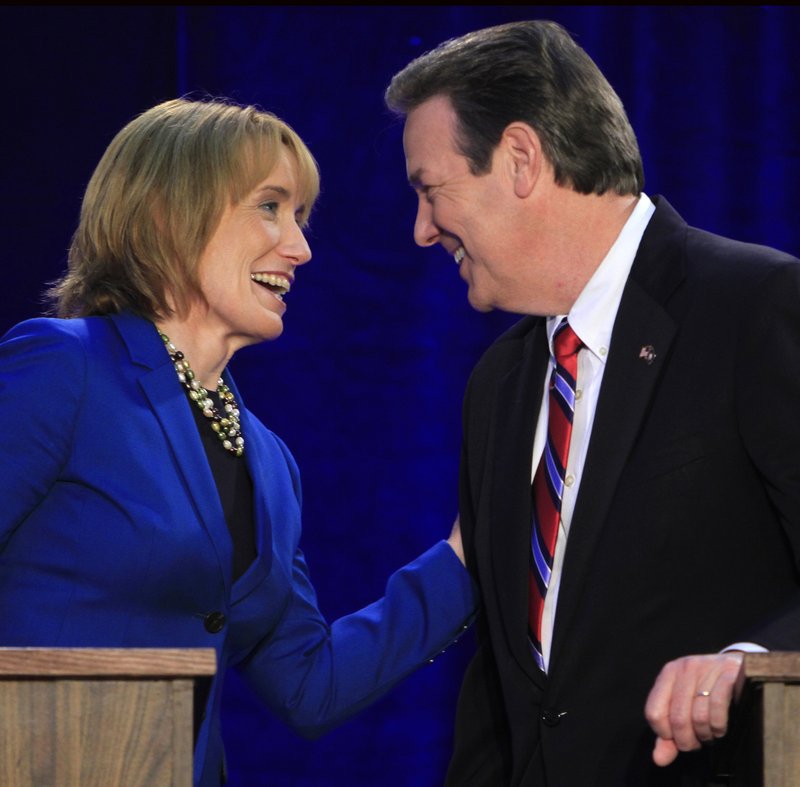WASHINGTON – Unions are shifting more of their political resources to state and local races this year as they try to head off passage of laws that could undermine bargaining rights, make it harder to organize or reduce their political muscle.
Labor leaders say their top goal remains re-electing President Obama, but several unions are redirecting their focus from the presidential and congressional campaigns to state and local races in dozens of states where they feel threatened.
In New Hampshire, unions want to keep the governor’s seat in Democratic hands to prevent a right-to-work measure.
In Maine and Minnesota, labor leaders hope to overturn Republican majorities in state legislatures. And in Michigan, unions are trying to enshrine collective bargaining rights in the state constitution.
The shift comes as organized labor is still reeling from battles in Wisconsin, Ohio, Indiana and other states where governors have sought to limit union rights for public workers or otherwise restrict union power.
“This year we’ve invested in these races more than ever before,” said Brian Weeks, political director of the country’s largest public workers union, the American Federation of State, County and Municipal Employees.
Weeks’ union has pledged to spend $100 million this election cycle to help re-elect Obama and other union-friendly candidates — most of them are Democrats — in federal, state and local races. A larger chunk of that is flowing to state and local candidates than in the past, though Weeks said the union is only spending “marginally less” on presidential and congressional races than four years ago.
Unions have been on the defensive since 2010, when Republicans seeking to weaken union muscle took control in 26 state legislatures, up from 14 two years earlier. Unions failed to recall Wisconsin Gov. Scott Walker, a Republican, after he signed a law limiting collective bargaining rights for most public workers.
They also saw Indiana become the 23rd state to pass a right-to-work law that limits unions’ ability to collect fees from nonunion workers.
In 2008, the nation’s largest firefighters union spent nearly 100 percent of its money on federal races. This year, for the first time, about 25 percent of the national union’s $14 million political budget is going to state and local campaigns.
“We have really pivoted and turned a lot of our work and resources into those state races,” said Harold Schaitberger, president of the International Association of Firefighters.
Unions can play a pivotal role in turning out voters in some states. The AFL-CIO says its volunteers will knock on 5.5 million doors, make 5.2 million phone calls and hand out 2 million leaflets at work sites in the final four days before the election. Voters in 25 states will receive about 12 million pieces of mail urging them to vote for union-endorsed candidates.
In New Hampshire, the GOP-led Legislature passed right-to-work legislation last year but failed to override a veto by Democratic Gov. John Lynch. Lynch is not seeking another term, so unions are pinning their hopes on electing Democrat Maggie Hassan over GOP rival Ovide Lamontagne, who has pledged to sign a right-to-work measure.
This week, AFSCME and the Service Employees International Union launched a $1.3 million television ad campaign in New Hampshire against Lamontagne.
The heavy union investment in New Hampshire’s gubernatorial race doesn’t sit well with Fred Kfoury, president and CEO of Central Paper Products Co., a 55-employee business in Manchester. Kfoury said a right-to-work law would help the state attract more new businesses.
“Unions have outlived their usefulness and have been an impediment to business growth and dynamics,” Kfoury said.
Send questions/comments to the editors.



Success. Please wait for the page to reload. If the page does not reload within 5 seconds, please refresh the page.
Enter your email and password to access comments.
Hi, to comment on stories you must . This profile is in addition to your subscription and website login.
Already have a commenting profile? .
Invalid username/password.
Please check your email to confirm and complete your registration.
Only subscribers are eligible to post comments. Please subscribe or login first for digital access. Here’s why.
Use the form below to reset your password. When you've submitted your account email, we will send an email with a reset code.